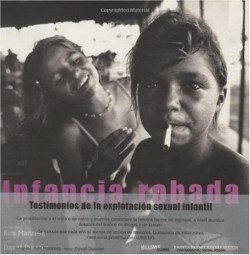Infancia Robada
“Adriana, thirteen years old, and her cousin Andrea, fourteen, have been street children since they were seven years old. They left their homes because they were beaten and/or violated.” Such is the sad case of the eight girls featured in this book, living on their own in the streets of Brazil.
The author and the photographer take the reader through a fast-forwarded seedy world of abridged childhood, where children parade as adults. Round faces with too-wise eyes stare out from the pages, and the flimsy clothes typical of kids of a tropical third-world country become the provocative trappings of an “adult” farce. The reader feels this world through a series of photographs and individual stories, documenting the rough and immediate world of these youngsters and the struggle of some of them to construct a normal life. The photos and text show their attempt to numb themselves to the brutal life of the street with drugs and alcohol; this precarious lifestyle leaves no safe place to guard money, so it is quickly spent on food, alcohol, and drugs. Many try to escape the street and learn a new way of life.
Neglected and often abused since infancy, these children are hard pressed to know “normal.” The centers that work on rehabilitating them have their work cut out for them. The brains of many of these children have already been hard-wired for impulsive anti-social behavior. Survival and stress are well-learned lessons. Very few girls have made the actual decision to be a prostitute, falling into the “job” in an unknowing, unplanned way; often with the aid of an adult male relative who sees the young girls as a legitimate resource.
The subject matter is discomforting, and the photographs, while not of classic beauty, present a valid and compelling issue, made clear and present by their stark clarity. Infancia Robada (also available in English) is a call to social consciousness, to become aware and outspoken about child exploitation. It is written with the premise that photographs can be used for social and moral reform, in the tradition of Margaret Bourke-White and Jacob A. Riis. Both repellent and fascinating, this book is imperative for anyone interested in developmental psychology, the exploitation of children in third world nations, and/or the disenfranchised of any population.
Disclosure: This article is not an endorsement, but a review. The publisher of this book provided free copies of the book to have their book reviewed by a professional reviewer. No fee was paid by the publisher for this review. Foreword Reviews only recommends books that we love. Foreword Magazine, Inc. is disclosing this in accordance with the Federal Trade Commission’s 16 CFR, Part 255.

